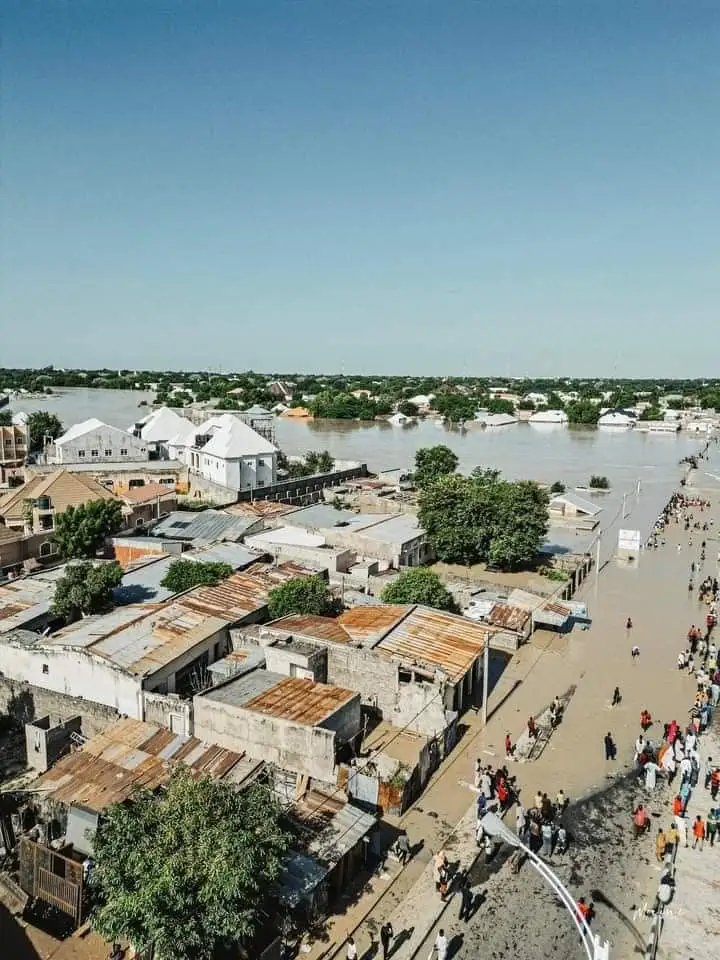Nigeria, often referred to as the “Giant of Africa,” has been grappling with recurrent flooding that has devastating effects on its population and economy.
Recent floods, particularly in places like Maiduguri, have highlighted the urgent need to examine the underlying causes of this crisis.
The persistent flooding is not merely a result of heavy rainfall; it is a complex interplay of climate change, urbanization, environmental degradation, and socio-economic factors.
One of the primary drivers of flooding in Nigeria is climate change, which has resulted in altered weather patterns.
The rainy season has become increasingly unpredictable, with intense downpours leading to flash floods.
For instance, in Maiduguri, a city that has recently experienced significant flooding, heavy rains overwhelmed drainage systems, leading to widespread devastation.
The increasing frequency and intensity of rainfall are directly linked to global climate change, which is altering local weather patterns.
Urbanization further exacerbates the flooding crisis. Rapid population growth in urban centers has led to the construction of informal settlements, often in flood-prone areas.
These settlements typically lack adequate drainage infrastructure, which makes them particularly vulnerable to flooding.
The situation in Maiduguri serves as a prime example; as the city expands, many residents find themselves living in areas that are highly susceptible to floodwaters, putting their lives and livelihoods at risk.
Deforestation and environmental degradation also play a significant role in increasing flood risks.
The removal of trees for agricultural expansion and urban development diminishes the land’s natural ability to absorb rainfall.
As forests are cleared, soil erosion becomes more prevalent, leading to increased runoff during heavy rains.
The loss of vegetation not only contributes to flooding but also affects biodiversity and local ecosystems, which are crucial for maintaining environmental balance.
The impact of flooding on livelihoods in Nigeria is staggering. The agricultural sector, which employs a significant portion of the population, often suffers catastrophic losses during flooding events.
In Maiduguri, recent floods destroyed crops and displaced farmers, leading to food shortages and economic instability.
The loss of agricultural productivity directly threatens food security and exacerbates poverty, creating a vicious cycle that is difficult to escape.
Additionally, flooding poses severe health risks to affected communities. Stagnant water can become a breeding ground for diseases such as cholera and malaria, putting vulnerable populations at greater risk.
In the aftermath of flooding, access to clean water and sanitation facilities often diminishes, further exacerbating public health challenges.
The psychological impact on individuals and families, including trauma and anxiety, is also significant and can hinder recovery efforts.
The socio-economic challenges associated with flooding are particularly pronounced among marginalized groups.
Women and children are often disproportionately affected by flooding, as they typically bear the brunt of household responsibilities during crises.
The loss of livelihoods can lead to increased gender disparities, as women may face barriers in accessing resources and decision-making power in recovery efforts.
To address the multifaceted challenges posed by flooding, the Nigerian government must adopt a comprehensive approach.
Improved urban planning is essential to create resilient infrastructure that can withstand extreme weather events.
This includes investing in drainage systems, flood barriers, and green spaces that can absorb excess rainfall.
Such infrastructure development can help reduce the impact of flooding on communities.
Moreover, sustainable agricultural practices should be promoted to enhance resilience against flooding.
Techniques such as crop rotation, agroforestry, and the use of drought-resistant crop varieties can help communities adapt to changing climate conditions.
Training programs for farmers on sustainable land management can empower them to mitigate the impacts of flooding while promoting food security.
Community awareness and education are critical components of a long-term strategy to combat flooding.
By informing residents about flood risks and equipping them with knowledge on emergency preparedness, communities can enhance their resilience.
Establishing early warning systems can also save lives by providing timely information about impending floods, allowing for proactive measures to be taken.
Lastly, international cooperation and funding can significantly bolster Nigeria’s capacity to address flooding.
Engaging with global partners to access technology, expertise, and financial resources can support initiatives aimed at climate adaptation and disaster risk reduction.
Collaborative efforts can also enhance data collection and research on climate patterns, enabling better preparedness and response strategies.
In conclusion, the persistent flooding in Nigeria is a multifaceted crisis that requires urgent attention.
By addressing the root causes, enhancing infrastructure, promoting sustainable practices, and fostering community resilience, the government can take significant strides toward mitigating the impact of flooding.
Through concerted efforts and collaboration, Nigeria can pave the way for a more resilient future for its citizens, reducing the devastating effects of flooding on livelihoods and the environment.
Olumide Idowu, Executive Director ICCDI Africa. X @OlumideIDOWU





